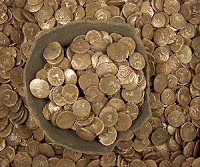And T was originally going to be taxes, but turned into treaure troves while I was writing. Oh, well.
The standard coin in my realms is the silver piece, and I'm playing with the idea that it's about equivalent to $100 these days, in terms of it's worth. So your normal peasant deals in copper and iron pieces and bits, and barters a lot.
A good tradesman, or a soldier on active duty, gets 1 SP/day as one days normal pay (the soldier's doesn't count for their food, which is usually taken out of it by a well-meaning officer). And a normal delivery mission that only armed adventurers can accomplish, with a few random encounters, might pay 5 GP each, providing the client stands to make much more money out of it.
This money poorness means that the average looted, buried or discovered treasure is worth a lot more than in other settings, and there are a number of shifty and avaricious nobles that consider that anything found on, within or even near their lands belongs, rightfully, to them. That's the problem with any feudal setting...
Treasure troves have their own legal and financial ramifications in real life. Where they can be guarded by magic, goblins, undead and worse, it gets even more complicated... These are reasonably common, both in terms of coins and gems looted from dungeons, and chests buried by rich or endangered people, as there are really no banks or banking structure, except for the rare money changer who will safeguard your precious coins for a small monthly fee...
To prevent any peasant who find a buried chest of coins from going AWOL, and to give armed strangers a reason to brave undead strewn tombs to liberate cold hard cash, there is a legal code in Kheldaria that most of the smaller surrounding kingdoms roughly apply as well.
For found treasure troves that have clear ownership (anything from jewellery known to have been stolen recently to several hundred year old remains bearing the Kordalh family seal), it is returned to the rightful owner, if they can be found within one year. The finder, if they found it legally, is entitled to 10% of the total assessed worth of the treasure, as is the Crown. If no owner is found, it defaults to the Crown, who happens to be the nearest Baron or Duke.
For treasure liberated on civilised lands that is unowned, half goes to the liberator and half to the land owner, with the Crown taking 50% of the total at the start in finders taxes. If the land is owned by the Crown (e.g. common grazing land, forests claimed by a noble, etc) it gets 75% of the total. Usually an armed group braving the bandits lair will negotiate a payment for undertaking the task in the knowledge that some or most of their loot will be claimed by the Lord that hired them.
For valuable loot claimed from Wilderness, or Areas of Astounding Danger (such as your local megadungeon), where the Crown is not in control, and can't really pretend that it is, the Crown can claim 20%(when you set foot back in civilisation). Justified as paying for said civilisation.
Note that this is only for large hauls. Not the 10 GP found in a werewolf's lair, or worn jewellery. But if you limp back into town with a donkey burdened down with chests, or have a sack bulging with jewels and silver candlesticks, the guards will want to know where you got it from, and will summon a tax collector to properly assess it.
Also, it's a relatively low magic setting, so magical gems, robes, etc are judged based on their apparent cost, unless one fires off while the tax collector is watching...
 | |
| Scandinavian Tax Collectors - probably on the left... |
Hiding one's loot or possessions before entering the city or passing the guard tower may seem attractive, but there is a reasonable chance that someone may find or steal it, and laying claim to items of worth that have obviously been hidden to avoid taxes is legally frowned upon.


I guess it's the same in the game world as it is in the real world.
ReplyDeleteYes, but I've never tried escaping from the tax man by jumping out a window, stealing a horse, and racing out the city gates, never to return.
ReplyDeleteAlthough it might be fun, I can see the long term consequences... :)